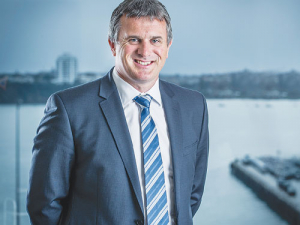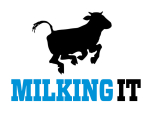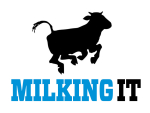She heard this at the World Business Council for Sustainable Development conference in Switzerland in April.
“By setting big ambitions, and leveraging its innovation mindset, Synlait is one NZ company well positioned to do that,” she says.
Synlait’s programme Lead With Pride, launched in 2013, will be key to progress in farm environments and sustainability, says chief executive John Penno. The programme rewards independently certified dairy farmers for best practice in the environment, animal health and welfare, social responsibility and milk quality.
The aim is to reduce GHGs by 35%/kgMS, water consumption by 20%/kgMS and nitrogen loss by 45% by 2028. Synlait will tailor support to each dairy farm.
David Williams, Synlait’s milk supply manager, says 28% of its farms are already certified best-practice under Lead With Pride and others are working to get certified. The company encourages this by increasing premium payments in the programme, in three tiers:
1. Gold: All dairy farmers meet good practice standards across the four Lead With Pride pillars.
2. Gold|Plus: Dairy farmers meet additional criteria in each pillar, considered best practice, and are independently certified annually. Premiums will increase from $0.06/kgMS to a potential $0.20/kgMS.
3. Gold|Elite: Dairy farmers can graduate from Gold|Plus after 12 months if they meet additional criteria, considered leading practice, and independently certified annually. Premiums will increase from $0.12/kgMS to a potential $0.25/kgMS.
Williams explains the premiums include an annual incentive of $0.08/kgMS for certified dairy farmers who choose to produce milk that is 100% PKE-free.
PKE use indirectly supports clear-felling of native forests in Indonesia, says Williams.
“That results in reduced carbon sequestration, degraded soil health, harmed waterways, and dramatically changed biodiversity.”
Dr Harry Clark, director of the New Zealand Agricultural Greenhouse Gas Research Centre, says the targets set by Synlait are ambitious but are achievable within the timeframe set.
“We look forward to working with Synlait suppliers to identify opportunities to reduce their emissions and to help monitor progress against the company targets,” says Clark.
Synlait’s start-up of its electrode boiler in January 2019 will be a major step towards reducing GHGs by 50% off-farm by 2028, it says. Not building more coal boilers will also contribute, as will looking at the existing coal infrastructure.
“We’re making a start now with [the electrode boiler] for our new advanced dairy liquids facility in Dunsandel,” says Neil Betteridge, Synlait’s director of operations. “[This is] breaking new ground. We’ve partnered with Orion and Energy Plant Solutions to make it a reality.”
Synlait is aiming to become a Certified B Corporation by meeting rigorous global standards of environmental and social performance, accountability and transparency, says Hamish Reid, Synlait director of sustainability and brand.
“There are currently 16 Certified B Corporations in NZ, and most are small-medium enterprises. We will be the first large-scale, NZX-listed and near-billion dollar revenue business to join this.”
A social investment fund will also be set up to support communities, organisations and initiatives aligned with Synlait’s sustainability goals.
Ambitious targets
Synlait has set itself many ambitious targets:
- Reducing greenhouse gas emissions (GHGs) by 35%/kgMS onfarm (-50% nitrous oxide, -30% methane and -30% carbon dioxide) and 50%/kgMS off-farm by 2028
- Reducing water consumption by 20%/kgMS both on- and off-farm by 2028
- Reducing nitrogen loss onfarm by 45%/kgMS by 2028
- Lifting its support for best-practice dairy farming through increased Lead With Pride premium payments, including a 100% PKE-free incentive
- No more new coal-fired boilers, and addressing its existing coal infrastructure
- Commissioning NZ’s first large-scale electrode boiler in January 2019 to provide process heat for its new dairy liquids plant at Dunsandel
- Joining the global push on sustainability by becoming a Certified B Corporation and adopting several of the United Nations sustainable development goals
- Setting up a social investment fund to support communities, organisations and initiatives aligned to Synlait’s sustainability goals.



















